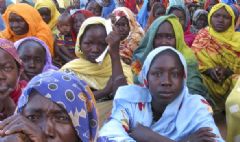Share
Human Rights Voices
While the UN devotes its human rights operations to the demonization of the democratic state of Israel above all others and condemns the United States more often than the vast majority of non-democracies around the world, the voices of real victims around the world must be heard.
Sudan, November 12, 2015
Girls as young as two being gang-raped next to UN refugee camps
Original source
Abuse victims in Darfur, western Sudan, have bravely described how armed gangs ambushed them, with some even losing consciousness while being raped.
The United Nations, as well as Britain, is being urged to act to stop the crisis after a new report revealed how armed gangs waging war on the nation are persistently targeting children with sexual violence.
Worryingly, the vast majority of assaults occurred close to United Nations' run camps, and many go unreported or are ignored by police and local authorities. A report by charity Waging Peace detailed how young women in the war-torn region were regularly ambushed by large groups of armed men.
One women, whose identity has been kept anonymous, said: "They raped eight women in front of my eyes, and then three of them, alternately, raped me...I couldn't run because I was pregnant."
Four out of five cases involve more than one attacker and those behind the assaults include local militia and uniformed government troops.
The charity described how women would often be preyed upon after leaving their refugee camp to collect firewood or to work on a farm.
The victim would either be assaulted immediately or confronted by her attacker earlier in the day and allowed to go on her way, only to be ambushed and attacked by the same man later, sometimes with a larger group of perpetrators.
In many of the incidents recorded there were multiple attackers who took it in turns to rape a victim, or who rape a larger group of women and girls simultaneously. Another victim told the charity: "After five hours...the child [aged 11] completely lost her consciousness, but he did not spare her."
The most shocking attack to be recorded involved 221 women and girls in the village of Tabit over 36 hours beginning on October 30, 2014.
A woman in her forties described the attack on her and her three daughters, two of whom were under the age of 11.
She told Human Rights Watch: "Immediately after they entered the room they said: 'You killed our man. We are going to show you true hell'.
"Then they started beating us. They raped my three daughters and me. Some of them were holding the girl down while another one was raping her. They did it one by one." Investigators found ethnicity was often a factor in who was targeted.
Almost three-quarters of the victims did not report their attack and campaigners say the law in Sudan confuses rape with adultery.
Until earlier this year, the Sudanese criminal code defined rape as 'zina', meaning intercourse outside marriage, without consent.
Women or girls were forced to supply witness statements from four males confirming that the act was 'without consent'.
Otherwise, they themselves would be charged with adultery and faced being jailed, flogged or stoned to death.
Waging Peace found locations controlled by UN peacekeepers were "relative safe havens", but two-thirds of the victims reported being raped in the area just outside the camp.
The charity has called on the UN to do more to protect young women and girls from sexual abuse.
Britain and other EU member states are also being urged to step up their response to the humanitarian crisis.
Aicha Elbasri, former spokesperson for the African Union-United Nations Mission in Darfur (UNAMID) said: "Victims of rape, systematic rape and mass rape in Darfur suffer in silence, as the use of these horrible crimes as weapons of war no longer commands international attention.
"But brutal attacks on the bodies and souls of women and girls continue unabated, and may have worsened in the absence of public scrutiny."
The testimonies have now been sent to the International Criminal Court to be considered as part of a long-running investigation into the conflict in Darfur, which was put on hold in 2014.

